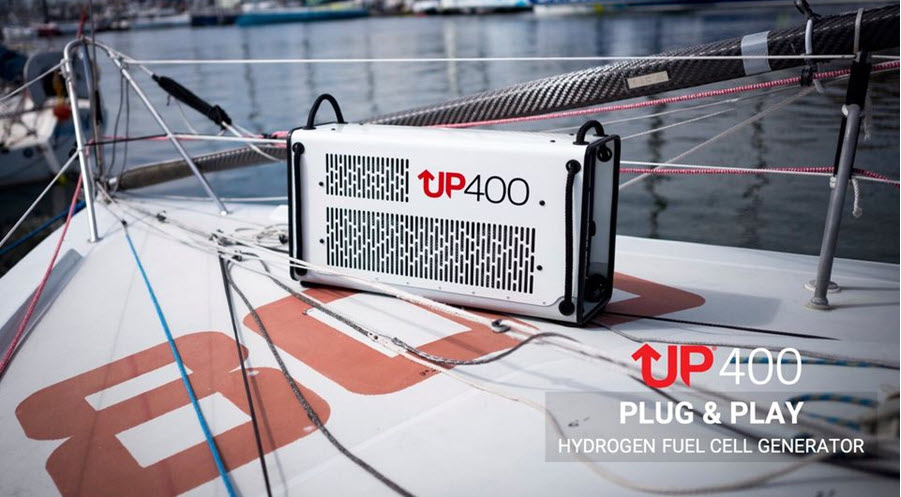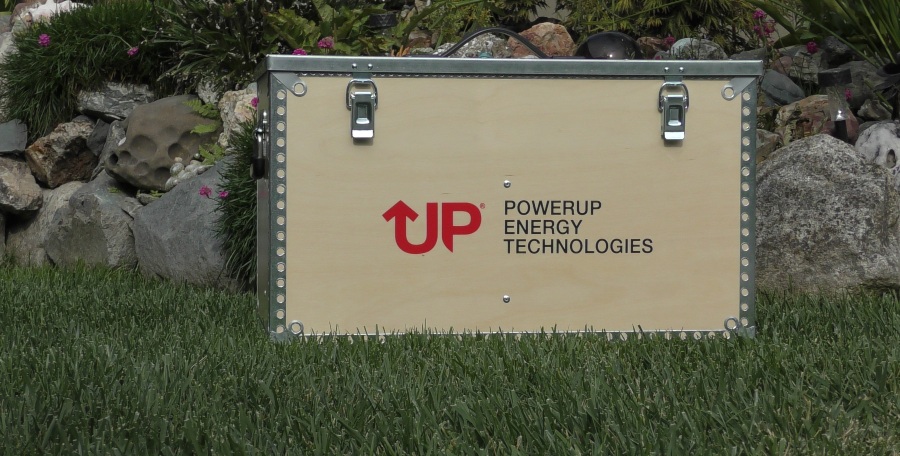
On 09.27.2021 Fuel Cells Works sat down with Ivar Kruusenberg who is the brilliant and enthusiastic CEO of PowerUP Energy Technologies, which is a company based in Estonia and is currently producing the only hydrogen-based electric generators of 400 watts or more. Presently, PowerUP is bringing its UP400 generator to market, and more products will follow in the months to come.

FCW. What has been the response so far by the maritime market to PowerUP’s products? Is there a real sense of need or are maritime customers still warming up to the idea of hydrogen?
Frankly speaking, they are warming up. Because the maritime industry and the same with the RV industry, they are some of the most challenging in the sense that they are really conservative. If you look into the maritime industry, it is not the first one to accept new technologies. That is why it is more challenging. From the other end they have big enough pain with the weight of batteries as well as with corrosion and maintenance issues with diesel generators so there is motivation to look into new technologies.
The lesson learned from current customers is that we have seen the need for bigger tanks and possibly also for the future a filling rate of 700 bars. To save weight and run the fuel cells longer a marina can be equipped with a refueling station with a pressure fill rate of 700 bars. Initially, our generator was consuming electricity and thereby hydrogen even when the generator was in sleep mode so we have been trying to reduce that one as well so that the hydrogen is only used when no solar is available. The sleep mode function was implemented because of the maritime sector, because what we saw there was that they use solar panels. But when there is not enough solar or the boat is at the wrong angle there is not enough electricity production, and then the hydrogen comes into play.
We will have quite soon a modular version of the UP400 which is also more convenient for sailors. The display will be separated from the UP400 itself.
FCW. Does PowerUP currently have any contracts with boat manufacturers and retailers to include its generators as an option to buy when a person is purchasing a boat or yacht? If it does have such agreements, then what companies are those agreements with? How successful have those agreements been so far? Out of 10 boat buyers how many are purchasing a PowerUP product (assume such agreements with boat manufacturers and retailers exists)?
Alfa Yachts production offers the option of the UP400 right now. We are also working closely together with Berkeley Marine Center. Together with them we hope to start installing hydrogen fuel cell based electric generators to the boats with electric motors to be more sustainable.
FCW. Presently a Honda EU2200i costs about $1,100 and produces 2,200 watts of power. How long does PowerUP feel it will take for hydrogen generators to reach parity with traditional generators where power and price are concerned?
Basically, we are planning to launch mid-2022 a 6kW system which would fulfill the needs of people who are looking to replace diesel generators and who have electric motors. Later this year we are going to launch a 1kW system.
Basically, right now we are getting the price of the fuel cell membranes, catalyst, and other components down even the valves in the generator. But we expect to be competitive price-wise with diesel generators within 4-5 years. We have seen the fuel cell components come down by 30-40% in price in the last year because there is more and more usage and the production has been scaled up.
FCW. What are PowerUP’s largest markets so far for its generators?
Off grid homes, maritime (sailing boats), and camper vans. We also see a big match with critical infrastructure such as cellular towers.
FCW. Does PowerUP plan on developing a portable electrolyzer to produce hydrogen and be a companion option to its generators?
Not at the moment. We are really focusing on the electric generators. We are not going to get to the electrolysis in the short term. We have been thinking after the launch of the 6kW of having a smart grid system by combining hydrogen with batteries and solar panels, and it would make sense to have an electrolysis system there. In the future there definitely will be a product that includes electrolysis as well in the package. We are first trying to get the 1kW and 6kW to market.
FCW. Is PowerUP working on integrating its fuel cells into things like riding lawnmowers or jet skis?
Yeah, we have been looking into it. That would be really fun since that is where the fuel cell can be implemented to give a long range.
FCW. Does PowerUP have any plans for an IPO?
Yes, we would love to do an IPO, but I do not see that happening in the next 3-5 years. We are definitely looking into doing an IPO. We see that it is possible [for PowerUP] to be profitable within a year.
Many countries in Europe and the U.S. are trying to get away from diesel. Hydrogen fuel cell technology is definitely the best way to replace diesel. Hydrogen is also similar to what people are used to where a person needs a gas and a generator. This creates a huge market opportunity for hydrogen.
FCW. Is there any international standard where portable hydrogen products are concerned that allow for swapping into, for example, a Doosan DS30 drone the hydrogen storage tanks from PowerUP? In other words, are PowerUP’s hydrogen tanks plug-and-play compatible or are they only able to work with PowerUP generators?
That is a major issue right now since there are no standards on that. We are working hard right now to get standards in place. It should be possible for the customer to go and get any tank with a standardized regular to plug and play.
Right now, we are trying to get different players from the market together to have these discussions, first of all. After this is done, we can talk about standardizing something. We need to first understand the common need for different players in the market, who is dealing with small portable tanks.
FCW. How well did the UP400 perform overall on the Fuga sailing yacht this past summer? What lessons, if any, were learned from that experience?
It performed really well. Actually, from there we did not face any issues. What we learned for sailing customers we need to provide the chargers together with the product. That was the main takeaway. So now if there is a sailing boat customer we always ask if there is a charger available for the lithium-ion batteries. For Fuga it worked perfectly aside from in the morning where the unit took a while to warm up since the weather in late spring and early summer was unexpectedly cold. For them it worked perfectly for the charging of their batteries.
Ivar also mentioned in the interview that PowerUP is also working on building a network of cabinets at marinas that will allow the cabinets to be accessed using a smartphone application. The goal will be to enable users to quickly exchange depleted canisters for filled one.
Additionally, PowerUP is focused on trying to make the hydrogen experience as seamless as possible for end-users. Currently it uses canisters that are composed of carbon fiber in order to maintain high utility without impacting the mobile aspect of the generator, similar to the tanks for paintball guns. However, Ivar mentioned that for some customers they are more comfortable with the look and construction of traditional tanks, like those for propane, and PowerUP is working to bring to market a similar tank configuration for hydrogen.
PowerUP is just getting started, but even at this point in time PowerUP is looking to have a positive influence on this world that goes well beyond having revolutionary products like the UP400. With PowerUP’s bold entry into the electrical generator segment of the market we are witnessing the start date of when polluting products, like diesel and gasoline generators, became irrelevant. Not only is that a remarkable feat for such a young company, but it offers something to the world that has been in short supply: hope. Even though Fuel Cells Works spent only a few hours with Ivar on 09.27.2021 it is clear that PowerUP is definitely a company worth paying close attention to.

Read the most up to date Fuel Cell and Hydrogen Industry news at FuelCellsWorks




